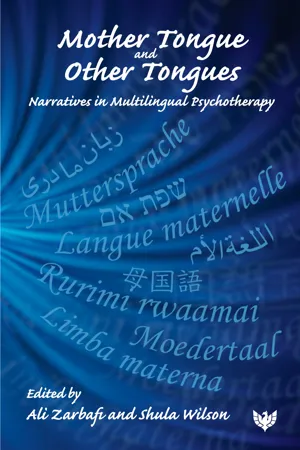
Mother Tongue and Other Tongues
Narratives in Multilingual Psychotherapy
- 166 pages
- English
- ePUB (mobile friendly)
- Available on iOS & Android
Mother Tongue and Other Tongues
Narratives in Multilingual Psychotherapy
About this book
We are living in times where the issue of identity and difference has taken on a more defensive hue. The tide is turning towards an inward-looking nostalgia of sameness based on fear rather than on understanding. The experience of hearing another language, the way it is spoken, and being faced with the image of the other is now more complex, imbued with projections of powerlessness, fear, terrorism, and survival. The issue of identity appears to have become even more complex.
All cultures are concerned with how we speak and communicate as this represents identity, history, and home. Communication is also essential for survival, both emotionally and socially. The speaking person is an individual but also part of a culture or cultures with dense collective and individual shapes. The issue of identity, that feeling of belonging, is essential, full of possibility, and, at times, very uncomfortable, as it touches the tensions between who we are and who we are becoming. This sits next to more complex historical experiences and memories of languages and cultures being changed or lost or banished due to the colonial, imperial, and regional moves of powerful nations in search of conquest and economic gain.
This collection addresses how language affects therapists and their patients, and how it can be understood culturally and therapeutically. Drawn from talks given at the Multi-lingual Psychotherapy Centre (MLPC), the contributors not only bring a therapeutic slant but also their other roles as academics, writers, and artists. These reflections, memories, and stories give a glimpse of the multilingual journey the MLPC has been exploring for over twenty years, and leave much food for thought.
The book contains contributions from Cédric Bouët-Willaumez, Giselle China, Patricia Gorringe, Natsu Hattori, Monique Morris, Esti Rimmer, and Edna Sovin.
Frequently asked questions
- Essential is ideal for learners and professionals who enjoy exploring a wide range of subjects. Access the Essential Library with 800,000+ trusted titles and best-sellers across business, personal growth, and the humanities. Includes unlimited reading time and Standard Read Aloud voice.
- Complete: Perfect for advanced learners and researchers needing full, unrestricted access. Unlock 1.4M+ books across hundreds of subjects, including academic and specialized titles. The Complete Plan also includes advanced features like Premium Read Aloud and Research Assistant.
Please note we cannot support devices running on iOS 13 and Android 7 or earlier. Learn more about using the app.
Information
Table of contents
- Cover Page
- Half Title
- Full Title
- Copyright
- Contents
- Acknowledgements
- About the editors and contributors
- Introduction
- CHAPTER ONE: Language of the mountains, language of the sea: living with exile and trauma as a journey between languages
- CHAPTER TWO: Living in-between languages and cultures
- CHAPTER THREE: Childhood, spoken and written selves
- CHAPTER FOUR: When the mother tongue is contaminated
- CHAPTER FIVE: Outre-mer et la langue de ma mère
- CHAPTER SIX: Silence, dissonance, and harmony: integrating the multilingual self
- CHAPTER SEVEN: Return to Berlin: my forbidden mother tongue
- CHAPTER EIGHT: Once upon … a silence
- CHAPTER NINE: The challenge of “home”
- Index